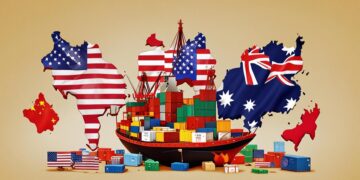The importance of trade partnerships in Australia’s economic recovery

Understanding the Impact of Trade Partnerships
Trade partnerships serve as a vital engine for economic growth and recovery in Australia, particularly during challenging times. These alliances not only facilitate essential goods and services exchange but also create a framework for mutual prosperity among nations. As we explore the importance of these partnerships, we can gain a clearer picture of how they contribute to a vibrant economy.
Increased Market Access
Increased Market Access: One of the most significant advantages of trade partnerships is that they open doors to new markets. For example, the Australia-United States Free Trade Agreement has allowed Australian exporters, particularly those in the agricultural sector, to gain better access to the lucrative U.S. market. This not only increases their customer base but also helps in raising the profile of Australian goods, such as wine and beef, known for their premium quality. The more markets a business can enter, the more resilient it becomes against local economic fluctuations.
Job Creation
Job Creation: Strengthening trade ties directly correlates with job creation. As businesses expand their operations and explore new markets, they need to hire more staff to manage growth. For example, during the recent uptick in demand for Australian minerals from countries like China and Japan, many mining companies have ramped up production and consequently increased their workforce, contributing to a decline in unemployment rates. Such ripple effects in job markets are essential for fostering community stability and economic growth.
Innovation and Competitiveness
Innovation and Competitiveness: Collaborating with international partners enhances the flow of ideas and technologies. For instance, Australian companies in the tech sector have benefited from partnerships with firms in Silicon Valley, gaining insights into cutting-edge practices and innovations. This exchange of knowledge not only boosts competitiveness but also accelerates the development of groundbreaking products, positioning Australia as a leader in various high-tech industries.
Diversification
Diversification: Trade partnerships also play a crucial role in helping Australia diversify its economy. A diversified economic portfolio minimizes the risks associated with dependence on a single market for exports. For example, Australia’s pivot towards Asia, particularly through trade agreements with ASEAN nations, has lessened its reliance on traditional markets like Europe and North America. This strategic diversification ensures that if one sector or market experiences a downturn, others can sustain overall economic health.
Addressing Challenges
While there are numerous benefits to trade partnerships, it is also critical to recognize and address potential challenges. Issues such as trade tariffs, geopolitical tensions, and fluctuating global markets can complicate these relationships. Policymakers and business leaders must continually adapt their strategies to navigate such complexities effectively.
In summary, the importance of trade partnerships in Australia cannot be overstated. They pave the way for enhanced market access, job creation, innovation, and economic diversification. By understanding both the opportunities and challenges inherent in these alliances, stakeholders can better position themselves for a robust recovery and sustainable economic growth in the times ahead.
The Role of Trade Partnerships in Economic Revival
Trade partnerships play an essential role in the broader context of Australia’s economic recovery. They are not just mere agreements between countries; they shape the foundation upon which Australia’s economy stands, enabling it to adapt and flourish in a rapidly changing global landscape. Examining the various dimensions of trade partnerships highlights their profound impact on Australia’s economic health.
Enhancing Export Opportunities
Enhancing Export Opportunities: Trade partnerships significantly enhance the export opportunities available to Australian businesses. For instance, agreements such as the Comprehensive and Progressive Agreement for Trans-Pacific Partnership (CPTPP) provide Australian exporters with reduced tariffs and formalised trade regulations in markets such as Canada, Japan, and Mexico. This direct access allows businesses, particularly those in sectors like agriculture and manufacturing, to increase their export volumes, thereby driving revenue. The benefits of such partnerships are particularly important for small and medium-sized enterprises (SMEs) that may struggle to compete without the support of an international framework.
Strengthening Supply Chains
Strengthening Supply Chains: The interconnected nature of global trade means that supply chains are often interdependent across borders. Trade partnerships help to streamline these supply chains, making them more robust and efficient. For example, the integration of Australia into the global dairy supply chain through various trade agreements has allowed local producers to access a wider variety of markets and increase product distribution. By reducing barriers and promoting communication between trading partners, businesses can source materials and manage logistics more effectively, ultimately lowering costs and improving their bottom lines.
Attracting Foreign Investment
Attracting Foreign Investment: Trade partnerships also serve as a beacon for foreign investment, which is crucial for economic recovery. When countries enter into trade agreements, they signal a commitment to stable trade relations and predictable economic environments. For example, Australia has witnessed an influx of foreign direct investment (FDI) from countries eager to tap into the Australian market, including investments in renewable energy and infrastructure. Such investments not only generate immediate economic activity but also lead to job creation and innovation, further bolstering economic resilience.
Advantages of Trade Partnerships
- Market Expansion: Increased access to international markets encourages competition and innovation.
- Shared Expertise: Collaborative relationships foster knowledge sharing across industries, enhancing productivity.
- Economic Resilience: Diversified trade relationships help mitigate risks related to economic downturns in specific regions.
In conclusion, trade partnerships are a fundamental component of Australia’s strategy for economic recovery. By enhancing export opportunities, strengthening supply chains, and attracting foreign investment, they create an ecosystem conducive to growth and innovation. Understanding these dynamics is crucial for stakeholders at all levels as they navigate the path toward a resilient and prosperous economy.
The Economic Ripple Effect of Trade Partnerships
Trade partnerships do not only open markets and attract investment; they also create a ripple effect that can benefit various sectors of the Australian economy. By fostering collaboration and innovation on multiple fronts, these partnerships empower businesses and communities alike, contributing to an overall sense of unity and progress in Australia’s economic recovery.
Driving Innovation and Technology Transfer
Driving Innovation and Technology Transfer: Trade partnerships facilitate the exchange of ideas and technologies across borders, which can lead to significant advancements in various industries. For example, Australia’s bilateral trade agreements with countries like Singapore and the United States have allowed local firms to access cutting-edge technologies and innovative practices. This exchange not only elevates Australian industries but also boosts the global competitiveness of Australian products. Consequently, businesses can improve their production processes, enhance the quality of their goods, and develop new offerings that cater to emerging consumer demands.
Boosting the Tourism Sector
Boosting the Tourism Sector: Tourism is a vital component of the Australian economy, contributing significantly to job creation and GDP. Trade partnerships often include provisions that simplify travel between nations, which can enhance inbound tourism. For instance, Australia’s travel agreements with countries such as New Zealand promote easier movement of people, resulting in an increase in tourist arrivals. With more international visitors, Australian businesses in hospitality, entertainment, and retail benefit from heightened consumer spending, providing a much-needed boost to the economy during recovery phases.
Encouraging Sustainable Practices
Encouraging Sustainable Practices: Trade partnerships are increasingly integrating sustainability goals, allowing Australia to position itself as a leader in producing environmentally friendly products. The value of partnerships that focus on sustainability goes beyond economic gains; they also contribute to long-term ecological benefits. For instance, agreements promoting sustainable forestry and fisheries ensure that industries operate responsibly while meeting international standards. This can enhance Australia’s reputation as a reliable supplier of sustainable products, attracting conscientious consumers and businesses alike.
Enhancing Workforce Skills and Training
- Skill Development: Trade partnerships often promote educational and vocational exchange programs, allowing Australian workers to gain new skills and expertise.
- Employment Opportunities: As trade partnerships strengthen various industries, they can lead to job creation, benefiting the workforce and communities across Australia.
- Global Competitiveness: Developing a highly skilled workforce helps Australian businesses stay competitive in the global market.
The vast potential of trade partnerships underlines their importance in relation to broader economic recovery efforts. By driving innovation, boosting tourism, encouraging sustainable practices, and enhancing workforce skills, these relationships create a robust platform that is essential for navigating current economic challenges and laying the groundwork for future growth.
Conclusion
In summary, trade partnerships are not merely avenues for economic exchange; they are vital components of Australia’s economic recovery strategy. As we navigate the challenges posed by recent global events, the benefits of these relationships become increasingly clear. They bolster innovation and technology transfer, allowing Australian businesses to thrive in a competitive landscape. For instance, partnerships with technology hubs like Silicon Valley open doors for Australian startups to access cutting-edge innovations, enhancing their product offerings and operational efficiency.
Moreover, by enhancing the tourism sector, trade partnerships contribute significantly to job creation and local economies. When countries engage in trade, they often see an increase in tourism between them, leading to more visitors exploring Australian attractions like the Great Barrier Reef or the cultural richness of cities such as Melbourne and Sydney. This influx not only creates jobs in the hospitality sector but also stimulates local businesses, transforming areas hit hardest by downturns.
Additionally, emphasizing sustainability within trade agreements positions Australia as a leader in eco-friendly practices. This approach not only helps protect our unique environment but also attracts consumers who are increasingly prioritizing ethical consumption. For example, initiatives that promote the export of sustainably sourced products, such as organic wines or renewable energy technologies, not only cater to a growing market demand but also secure Australia’s reputation as a trusted global supplier.
Lastly, promoting skill development and educational exchange enriches the workforce. Collaborations with international educational institutions can provide Australians with the training and knowledge necessary to meet the demands of a rapidly changing global economy. Programs that facilitate study abroad opportunities or vocational training partnerships equip Australian workers with new skills, ensuring they remain competitive in various sectors.
As we look towards the future, it is essential to recognize that the strength of Australia’s economy is intrinsically linked to the strength of its trade partnerships. By fostering these connections, we can cultivate a more resilient and innovative economy that not only recovers from past difficulties but flourishes in the years to come. The path forward is clear: by investing in our trade relationships, we are investing in the prosperity of all Australians.

James Carter is a financial writer and advisor with expertise in economics, personal finance, and investment strategies. With years of experience helping individuals and businesses make complex financial decisions, James offers practical insight and analysis. His goal is to give readers the knowledge they need to achieve financial success.






